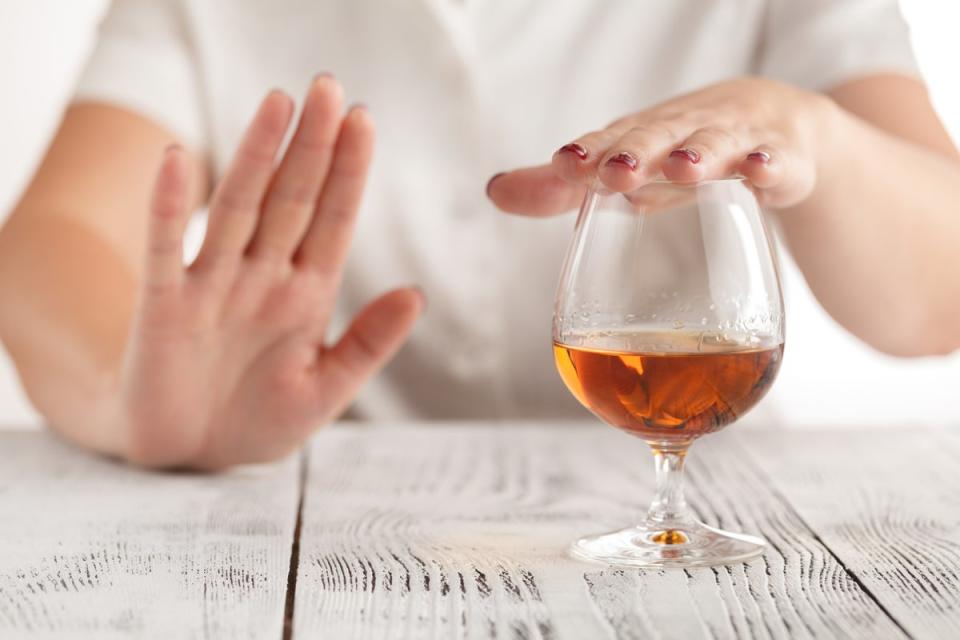‘It’s the thing we argue about the most’: Can a drinker date a non-drinker?

They say that love, like wine, gets better in time. Well, that might only be true if you’re drinking the same amount. According to a new study, couples who drink together have better relationships – and they may even live longer, too. The report, conducted by scientists at the University of Michigan, was based on interviews with more than 4,500 married or cohabiting couples that took place every two years over the space of two decades.
Inspired by a theory known as “drinking partnership”, the study’s primary purpose was to look at alcohol use in couples and the health implications. “And we found, interestingly, that couples in which both indicated drinking alcohol in the last three months lived longer than the other couples that either both indicated not drinking or had discordant drinking patterns in which one drank and the other did not,” explained lead author, Dr Kira Birditt.
The researchers concluded that having similar drinking habits is so vital because it reflects other lifestyle compatibilities. “We’ve also found in other studies that couples who drink together tend to have better relationship quality, and it might be because it increases intimacy,” Dr Birditt added.
It’s not hard to imagine why this is the case. If one person is consistently going out and rolling home at 3am stinking of cigarettes and wine while the other is trying to clock their eight hours, of course there’s going to be some sort of disagreement. Because the way we drink says a lot more about the way we live our lives than we might think. It dictates how we spend our time and who we spend it with. It defines the structure around our weekends. It determines the days we have the energy to spend out and about, compared to those we waste on our sofas as we battle out a hangover. It’s no wonder it can have such an impact on our relationships.
“One of the markers of a healthy relationship is going to be compatibility, and compatibility can be as simple as similar lifestyle choices,” explains relationships coach and behavioural scientist, Katarina Polonska. “Someone who chooses to go out and party every Friday night and come home at 5am is likely going to have a lot less in common with someone who wants to have a night in drinking camomile tea on the sofa each Friday. The more synergies there are in the habits, the more congruence there is in the lifestyle compatibility.”
The faster you realise this, the better. “My ex was a heavy drinker and I split with him partly due to this,” says Yaz*, 56. “He had the characteristics of an alcoholic: lies, selling valuable items when I went travelling for 18 months. I googled him recently and saw that he had lost his job due to spending £300 each week on alcohol and stealing from his clients. I was not surprised, and saddened, of course, as he suffered a stroke due to this stress. I had a lucky escape.”
It can be particularly difficult to spot a drinking problem, though, given how warped societal ideas around alcoholism are, and the myths and stereotypes that persist and subsequently stop people from realising when they need help. According to the charity Drink Aware, signs of alcoholism include impaired control over alcohol use, giving increasing priority to drinking in your daily life, and experiencing unwanted physical or mental effects from drinking, alongside an increased tolerance.

But what happens when someone recognises this in themselves and, after deciding to go sober, starts dating people who drink? “I’ve actually never dated someone who’s sober,” says Bella*, 29, who gave up drinking in 2018. “On the first date, I always order a Diet Coke and people usually don’t ask me about it. But by the second, they’re like, ‘so are you doing Dry January? Or just taking some time off?’ I get quite insecure about it with strangers, particularly when they seem alien to the idea of sobriety. So I often lie and tell them I haven’t drunk for a year or two, even though I’m six years sober.”
Even those on the less extreme end of the scale may struggle with drinking incompatibilities, though, and that’s partly due to the way we judge other people’s drinking habits. “If we drink more or less alcohol than someone else, then this can be accompanied by a whole raft of explicit or implicit criticism,” says counsellor Georgina Sturmer. “If we drink ‘too much’, then perhaps our partner will have something to say about our behaviour when we are drunk, or our health, our hangovers, and our spending. If we drink ‘too little’ then perhaps we will be seen as less fun, or judgemental in some way.”
For some couples, this is an ongoing issue. “My partner barely drinks at all but I love a drink, and it causes quite a lot of clashes in our relationship,” admits Jess*, 46. “When I was single, I’d go to pubs with a book on my own because I love them so much, and I couldn’t wait to find someone to share that with. But although our first few dates were in pubs, it turns out he doesn’t actually like them, or drinking – whenever it was his round, he was apparently ordering water instead of the G&Ts I was getting him.”
I often lie and tell dates I haven’t drunk for a year or two, even though I’m six years sober
Bella*, 29
Jess has been with her boyfriend for nine years but still struggles with the incompatibility. “When I drink at home, it’s always accompanied by quite a lot of judgement and tutting. It’s probably the thing we argue about the most, because it drives me nuts, and I’d love us to be able to go out together instead of me drinking at home on my own with him staring at me in disapproval.”
Of course, all this can be exacerbated by underlying issues in a relationship. “If there are other things at play, then having dissimilar drinking habits might add to a sense of disquiet,” adds Sturmer. It can also bleed into financial issues, too. “If you have joint finances, there might be a sense of embarrassment or resentment if the shared purse is funding one person’s drinking habit more than the other.”
So what can be done? If neither one of you is willing to compromise on how much or how little you drink, then it can create quite the stumbling block in your relationship. And it’s one that will, in all likelihood, only lead to more discord the longer it continues. In the first instance, you should try communicating your concerns with your partner. Then when you start looking for potential solutions, it’s best to consider how you can both make compromises.
“Figure out what is making things difficult,” says Sturmer. “Maybe it’s about behaviour, hangovers or spending money. It will be different for every relationship.” Also be sure that the conversation you’re having reflects your actual concerns, and not wider unresolved relationship issues. “If you are feeling as if you have incompatible drinking habits, reflect on where this comes from,” says Sturmer. “Is it really a serious worry that could get in the way of your relationship? Or is it potentially also wrapped up in other fears about where the relationship is going? Or past experiences that you’ve had in other relationships where alcohol is concerned?” Most importantly, try not to be critical in these discussions, as that will only escalate things further.
“Try exploring what other vices or ‘fun’ habits you might have that you can integrate, whether that’s an activity, or food item, or mindset to adopt,” adds Polonska. “Also consider the benefits of the incompatibility: what is there to learn? Are there alternative drinks and new activities you can introduce each other to? Getting curious about what there is to learn from each other, and bringing a gentle, non-judgemental mindset, can lead to growth and harmony in a relationship.”
If you handle things right, who knows? You could wind up with a healthier relationship to one another and also to alcohol. Winners all round.
*Names have been changed


